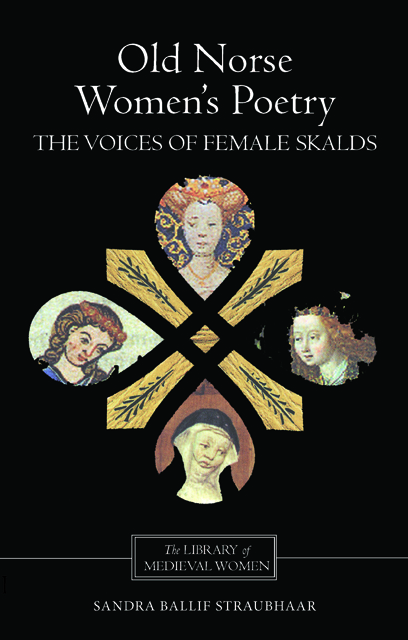Book contents
- Frontmatter
- Contents
- Foreword
- Abbreviations
- Introduction
- I. Real People, Real Poetry
- II. Quasi-Historical People and Poetry
- III. Visionary Women: Women’s Dream-Verse
- IV. Legendary Heroines
- V. Magic-Workers, Prophetesses, and Alien Maidens
- VI. Trollwomen
- Old Norse Literature Time Line
- Glossary of Personal Names
- Bibliography
- Index of Names
- Library of Medieval Women
III. - Visionary Women: Women’s Dream-Verse
Published online by Cambridge University Press: 14 February 2023
- Frontmatter
- Contents
- Foreword
- Abbreviations
- Introduction
- I. Real People, Real Poetry
- II. Quasi-Historical People and Poetry
- III. Visionary Women: Women’s Dream-Verse
- IV. Legendary Heroines
- V. Magic-Workers, Prophetesses, and Alien Maidens
- VI. Trollwomen
- Old Norse Literature Time Line
- Glossary of Personal Names
- Bibliography
- Index of Names
- Library of Medieval Women
Summary
This section contains poetry heard by women in dreams, and later repeated to listeners as the dream is retold. Like Guðrún P. Helgadóttir, I have chosen to count these stanzas as the compositions of the dreamers.
Although there are scattered examples of dream-poetry and portents throughout the family sagas and kings’ sagas, it is in Sturlunga saga, the thirteenth-century contemporary chronicle of Icelandic civil war and the last days of the Icelandic republic, that this narrative trope really comes into its own. All of the entries in the following section are from Sturlunga saga. In the visionary dreams of Sturlunga saga, the dream-personage tends to be male when the dreamer is a woman, and is not uncommonly female when the dreamer is a man; but it will be noted that the longest entry below does not fit this pattern.
The speakers of the poetry, within the various dream contexts recounted here, include ghosts, dead (or soon-to-be-dead) men and women, legendary figures and other supernatural agents. It is a common feature of Icelandic folklore to this day -- in which supernatural portents are taken quite seriously -- that the speech of ghosts and damned souls has several identifiable features, notably including the repetition of phrases, as in the old poetic spell-casting meter, galdralag.
All of the entries in this section are in a simple Eddic style. Although they are not as metrically complex as the poetry in Sections I or II, for the golden age of skaldic poetry was long past, many of them are memorable pieces of poetry. A good example is Halldóra Þórðardóttir’s fragment, which echoes the earlier, anonymous Darraðarljóð (see below).
All but one of these poetic visions are doom-prophecies presaging one of the great climaxes of Sturlunga saga, the fall of Sturla Sighvatsson at the battle of Ǫrlygsstaðir in 1238. The most memorable vision, however – and also the longest – refers to other climactic events, the burning of the farmstead at Flugumýrr (1253) and the subsequent battle of Þverá (1255).
Kona at Munka-Þverá
1238, Iceland
Sturlunga saga: Íslendinga saga, ch. 130 (ed. Guðbrandur Vigfússon, and ed. Jón Jóhanesson et al.)
- Type
- Chapter
- Information
- Old Norse Women's PoetryThe Voices of Female Skalds, pp. 39 - 48Publisher: Boydell & BrewerPrint publication year: 2011



